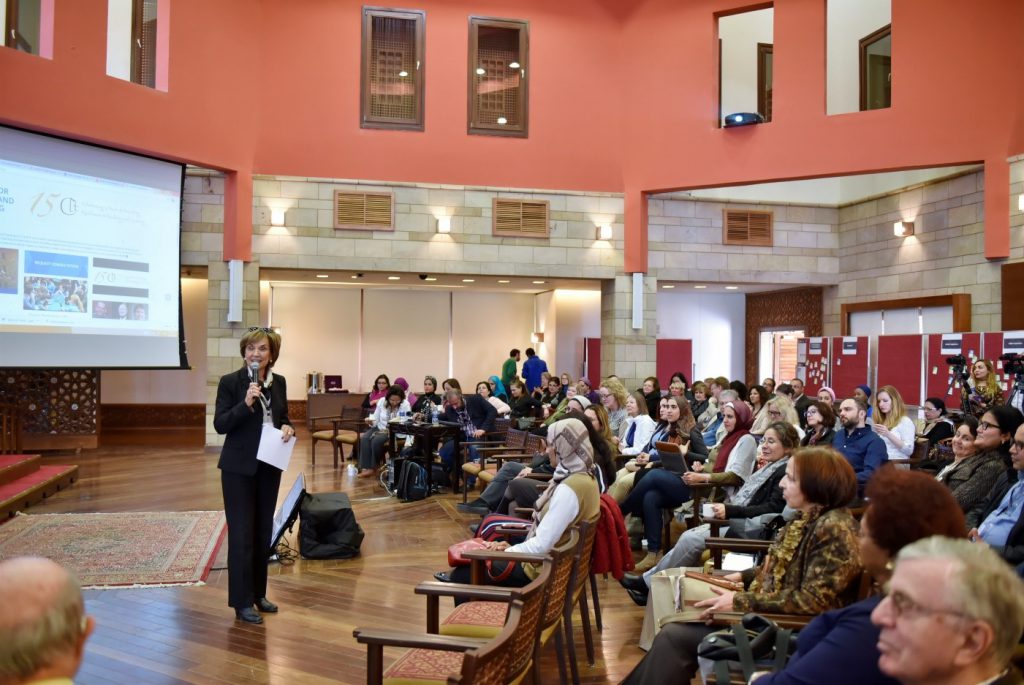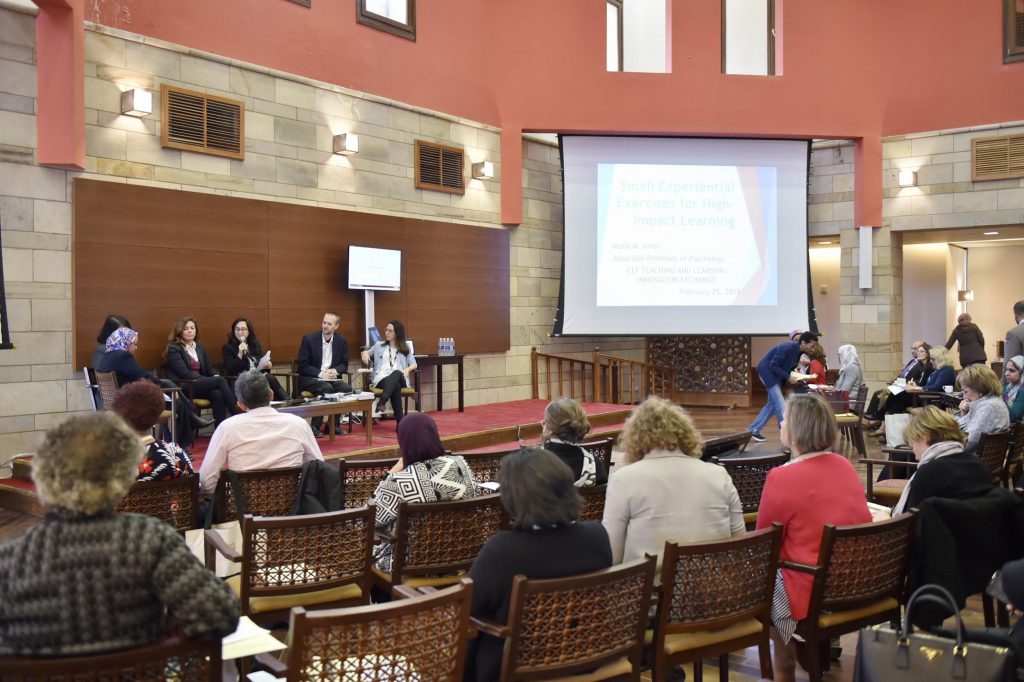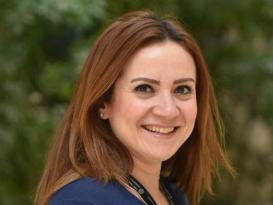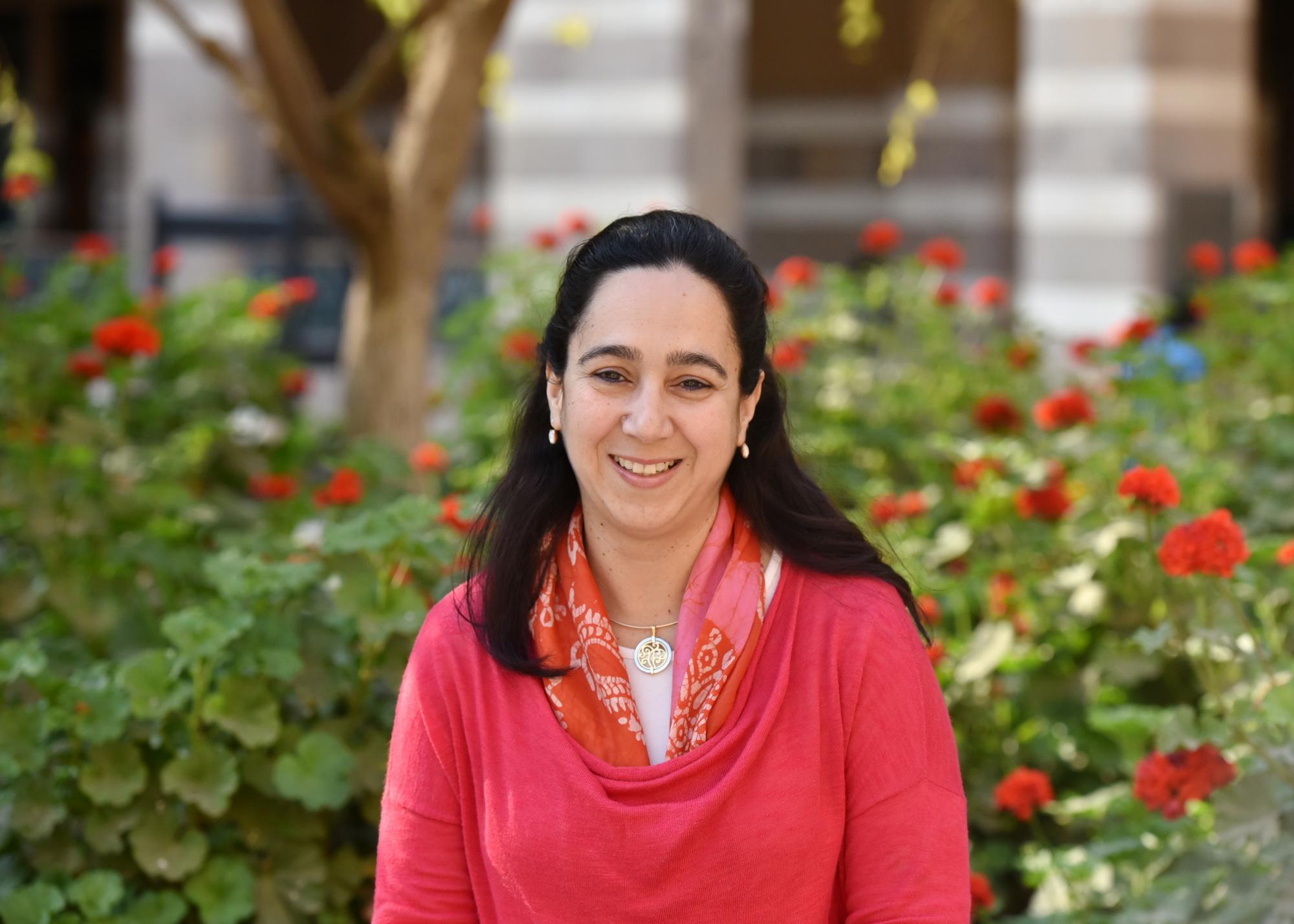
The Center for Learning and Teaching (CLT) at AUC, in collaboration with the AMICAL consortium, organized a three day event in February featuring CLT’s annual Symposium, 15th anniversary celebration and a Teaching and Learning Innovation Exchange (TALIX) day. The event was attended by AUC faculty, staff and students, as well as guests from other Egyptian universities and international participants from various AMICAL institutions. The event provided an opportunity for sharing and exchanging innovative teaching experiences and projects including a mapping exercise that gave participants the opportunity to network by communicating with the AUC and AMICAL community areas of interest and collaboration opportunities.
February 25th: CLT Symposium
At the CLT Symposium, faculty presented pedagogical and technology-supported teaching innovations to promote student learning and engagement. The symposium also featured lightning talks on faculty experience relating to “Technology-Supported Teaching Innovation” where the faculty members shared their experiences with integrating technologies such as podcasts to allow for a different mode of expression, and how they used student response systems to enhance self and peer feedback to students. There were also sessions highlighting faculty’s integration of digital humanities and quantitative reasoning into their courses. Digital Initiatives at AUC was another topic of the lightning talks, where faculty shared how they implemented these initiatives with a spotlight on collaborations between MIT and AUC on a MicroMasters in Economics, and Biology/Mathematics courses re-designed to integrate open MITx materials. Faculty also spoke about online intercultural learning in finance, the development of an open textbook in music, and blended learning courses currently being developed at AUC. There were also sessions highlighting teaching innovations such as role-play, gamification, active learning, writing for empowerment and case studies.
Paul Prinsloo from the University of South Africa (UNISA) invited the audience to reflect with his keynote talk “How do we know they learn? The changing scope and role of evidence in student learning”, reminding all of us to question why and how we assess learning and whether we are assessing students the right way. Feedback from the session included: “Genuinely new food for thought to consider how we relate to students, very interesting and strangely moving to witness Paul’s engagement despite the exorbitant number of students he reaches.”
Day 1 also featured AUC speaker Nagla Rizk (Economics department and director of Access to Knowledge for Development) who spoke about “Digital Technologies, Openness and Peer Collaboration: An “Access to Knowledge” Approach to Teaching and Learning”. She shared her thoughts on questioning the mainstream and offering alternative models, including advocating for open and digital education to empower citizens. For student Osama Ismael, Rizk stressed, “that the role of knowledge and technology is a cornerstone of human development and from the wider lens it promotes freedom, dignity and self-esteem”. One faculty participant liked the “practical focus” of the talk, where Rizk was “tying digital technologies, openness and collaboration with actual examples of this happening”. Another participant learned about “the importance of inclusions towards global access to knowledge with a starting point of students connecting to other students [online]”.
The CLT Symposium included an interactive panel where five faculty members shared their experience in relation to high impact practices that they used as teaching innovations at AUC. Participant comments focused on learning about the importance of experiential learning in practice in a variety of disciplines: finance, psychology, statistics, architecture and writing. One participant shared her thoughts after the panel:
“It’s ok to be our authentic self – experiences – not just our knowledge. Be better at “selling ourselves” to students in terms of transformative learning experience. To be a greater advocate for taking teaching risks and being rewarded rather than penalized for that if there is a dip in one’s course evaluations”
In line with AUC’s mission in promoting quality education this yearly symposium contributed to promoting a culture of sharing, collaboration and learning from others. CLT’s Artist Associate Mahmoud Shaltout created sketchnotes capturing the content of the day, which you can access here.
February 26: 15th Anniversary Celebration

CLT’s 15th Anniversary Celebration featured “CLT Teaching and Learning Hubs” where CLT members shared experiences on particular topics, with CLT providing on-the-spot consultations. Hubs included: “How do I know my students are learning?” which focused on questions related to assessment “How can technology enhance the way I teach?”, focusing on giving visitors ideas on integrating various technology platforms in their classrooms, “How can I design group work that “works”?” showcasing collaborative and cooperative learning designs and how to implement them in class and finally, “How can I engage and motivate my students?” offering different strategies to engage and motivate students.
Fady Morcos and Caroline Mitry (CLT) facilitated a “co-design” session where faculty and students worked together in teams to tackle challenges related to student and faculty motivation and engagement at AUC and to come up with creative strategies to overcome those challenges. Some of
the reflections shared by those who participated in this activity include: “(This was a) good opportunity for students to talk honestly about their experience” and a student, Ayah Safwat, blogged “I didn’t ever put my shoes in a professor’s shoes. In fact I’ve never given much thought to the fact that they might be motivated or not to come and teach”. More detailed outcomes of this session will be shared by CLT with the AUC community via an upcoming newsletter.
CLT wrapped up the second day with our keynote speaker Tim Sullivan (currently President of American University of Kuwait, and former Provost and political science faculty member at AUC). Sullivan was AUC provost at the time CLT was established 15 years ago, and his support for it was instrumental to its success.
With his keynote “Energizing the Unmotivated”, he asked questions that resonated deeply with both faculty and students. One student who attended the session, Sarah El-Naggar, blogged that what resonated most was Sullivan’s provocative question, “did the students fail or did we fail?”. Another student, Merna Kostandy blogged:
[Sullivan said] “Students work best when the professors are aware of the needs of the students as individuals not as an undifferentiated group,”…
And I believe in that with all my heart. It feels relieving when professors are dealing with a student on a personal level rather than feeling that you are dealing with a robot that is not understanding. Fortunately, I find that in AUC…
February 27: Teaching and Learning Innovation Exchange (TALIX) with AMICAL
During TALIX, participants from AMICAL institutions exchanged knowledge and built collaborations through roundtable discussions on topics such as digital humanities, digital literacies, building and developing centers for learning and teaching, and gamification. Some of the AMICAL participants along with CLT team members and AUC faculty decided on ideas for collaboration, among which were: The Digital Project Interest Group, where they will share resources and experiences. Another project was developing a “starter kit” of shared resources and ideas from established centers of teaching and learning, supporting AMICAL institutions start their own. CLT members and faculty from AUC and AMICAL institutions also discussed inter-institutional podcasting and gamification projects.
The day also included two parallel workshops. “The Changing Nature of the Scholarship of Teaching and Learning”, by Paul Prinsloo where he interactively discussed the different perceptions of what a scholar is, bringing to light the differences between institutional roles and expectations and the ways individuals perceive themselves as scholars,researchers or practitioners or any combination of these.The other workshop was facilitated by AUC’s Abdel Aziz Galal and Mark Muehlhaeusler, on “Digital Humanities and the Preservation of Cultural Heritage”. The first part of the workshop was about defining cultural heritage and looking at the different types of heritage, including tangible and intangible culture as well as natural heritage, followed by an introduction on the digital humanities as one of the possible approaches to scholarship offering a variety of tools that ultimately serve to digitally preserve cultural heritage.
The final keynote was by George Siemens (University of Texas, Arlington) “Creating a model of higher education in a networked and technologically infused society”.He spoke passionately about the needs of our students and systems becoming ever more complex and inter-related.
Guirguis Samir, a student who watched the keynote, blogged that he found the talk interesting mainly “because it reflected a dark side of technologies rather than the norms when people talk about technology that it might help and it can be used for a better future” and remarked on how Siemens’ question “what is left for us when technology outperforms humans?” got him thinking deeply. Another student, Farida blogged that her main takeaway from the talk was Siemens’ point that “networks promote sometimes democracy but in reality it destabilize[s] it and challenge[s] the idea of equity”.
On a final note, we had the opportunity to interview Jeff Gima, Director of AMICAL Consortium, who reflected on the shared history between AMICAL and CLT and the unique opportunity for other faculty development centers across AMICAL to learn from AUC and each other. Jasmina Najjar, faculty member at the American University of Beirut told us she was inspired to learn about how AUC faculty innovate in their classrooms, especially that she was herself interested in things like blended learning and gamification. She also mentioned the opportunities for collaboration with others across AMICAL.
This diverse, interactive event marked 15 years of promoting excellence in teaching and learning, building community connections and sharing experiences. CLT hopes to continue celebrating teaching and learning through a variety of professional development events for faculty throughout 2018 and into AUC’s 100 Year Centennial in 2019. If you missed any of the keynotes, you can watch the recordings at http://bit.ly/TALIXagenda



